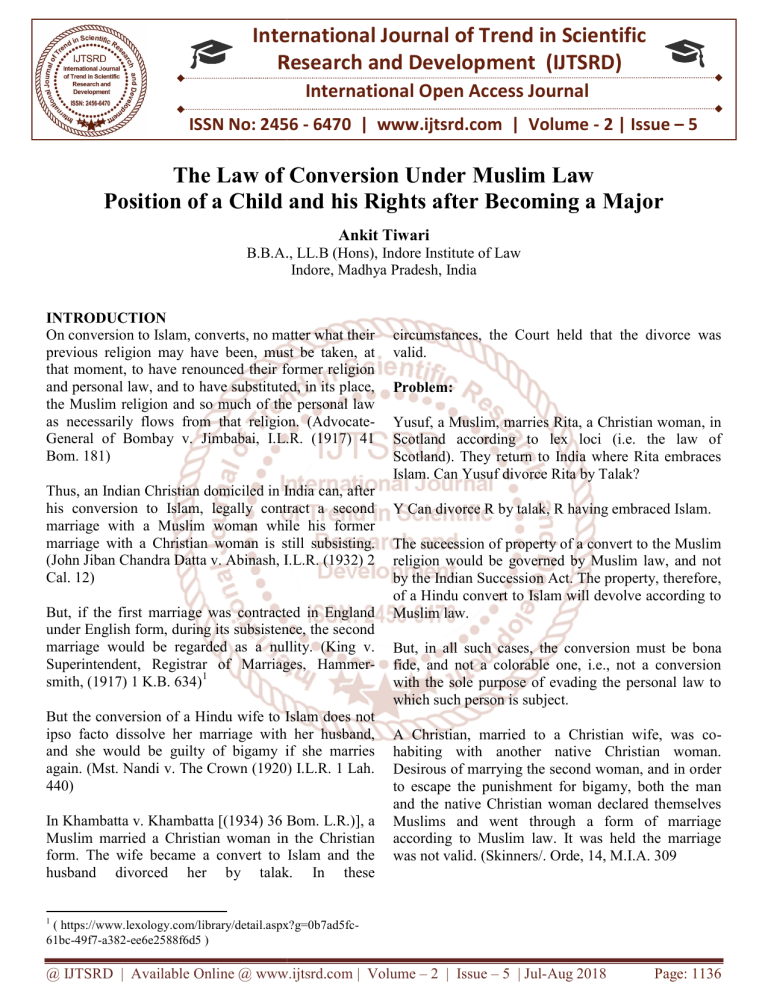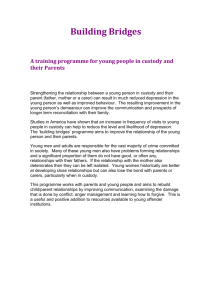
International Journal of Trend in Scientific
Research and Development (IJTSRD)
International Open Access Journal
ISSN No: 2456 - 6470 | www.ijtsrd.com | Volume - 2 | Issue – 5
The Law of Conversion Under Muslim Law
Position of a Child
hild and his Rights after Becoming
ecoming a Major
Ankit Tiwari
B.B.A.,
A., LL.B (Hons), Indore Institute of Law
Indore, Madhya Pradesh, India
INTRODUCTION
On conversion to Islam, converts, no matter what their
previouss religion may have been, must be taken, at
that moment, to have renounced their former religion
and personal law, and to have substituted, in its place,
the Muslim religion and so much of the personal law
as necessarily flows from that religion. (Advocate
(AdvocateGeneral of Bombay v. Jimbabai, I.L.R. (1917) 41
Bom. 181)
Thus, an Indian Christian domiciled in India can, after
his conversion to Islam, legally contract a second
marriage with a Muslim woman while his former
marriage with a Christian woman is still sub
subsisting.
(John Jiban Chandra Datta v. Abinash, I.L.R. (1932) 2
Cal. 12)
But, if the first marriage was contracted in England
under English form, during its subsistence, the second
marriage would be regarded as a nullity. (King v.
Superintendent, Registrar of Marriages, Hammer
Hammersmith, (1917) 1 K.B. 634)1
But the conversion of a Hindu wife to Islam does not
ipso facto dissolve her marriage with her husband,
and she would be guilty of bigamy if she marries
again. (Mst. Nandi v. The Crown (1920) I.L.R. 1 Lah.
440)
In Khambatta v. Khambatta [(1934) 36 Bom. L.R.)], a
Muslim married a Christian woman in the Christian
form. The wife became a convert to Islam and the
husband divorced her by talak. In these
circumstances, the Court held that the divorce was
valid.
Problem:
Yusuf, a Muslim, marries Rita, a Christian woman, in
Scotland according to lex loci (i.e. the law of
Scotland). They return to India where Rita embraces
Islam. Can Yusuf divorce Rita by Talak?
Y Can divorce R by talak, R having embraced Islam.
The suceession of property of a convert to the Muslim
religion would be governed by Muslim law, and not
by the Indian Succession Act. The property, therefore,
of a Hindu convert to Islam will devolve according to
Muslim law.
But, in all such cases, the conversion
conver
must be bona
fide, and not a colorable one, i.e., not a conversion
with the sole purpose of evading the personal law to
which such person is subject.
A Christian, married to a Christian wife, was coco
habiting with another native Christian woman.
Desirous
us of marrying the second woman, and in order
to escape the punishment for bigamy, both the man
and the native Christian woman declared themselves
Muslims and went through a form of marriage
according to Muslim law. It was held the marriage
was not valid. (Skinners/. Orde, 14, M.I.A. 309
1
( https://www.lexology.com/library/detail.aspx?g=0b7ad5fc
https://www.lexology.com/library/detail.aspx?g=0b7ad5fc61bc-49f7-a382-ee6e2588f6d5 )
@ IJTSRD | Available Online @ www.ijtsrd.com | Volume – 2 | Issue – 5 | Jul-Aug
Aug 2018
Page: 1136
International Journal of Trend in Scientific Research and Development (IJTSRD) ISSN: 2456-6470
Position of a child and his right after becoming
major - Child custody is a term used in family law
courts to define legal guardianship of a child under
the age of 18. During divorce or marriage annulment
proceedings, the issue of child custody often becomes
a matter for the court to determine. In most cases,
both parents continue to share legal child custody but
one parent gains physical child custody. Family law
courts generally base decisions on the best interests of
the child or children, not always on the best
arguments of each parent.
In general, courts tend to award PHYSICAL child
custody to the parent who demonstrates the most
financial security, adequate parenting skills and the
least disruption for the child. Both parents continue to
share legal child custody until the minor has reached
the age of 18 or becomes legally emancipated. Legal
custody means that either parent can make decisions
which affect the welfare of the child, such as medical
treatments, religious practices and insurance claims.
Physical child custody means that one parent is held
primarily responsible for the child's housing,
educational needs and food. In most cases, the noncustodial parent still has visitation rights. Many of the
religions practicing in India have their own personal
laws and they have their different notion of custody.'
Custody Under Hindu Law:
All the personal law matrimonial statutes make
provisions for dealing with the issue of child custody.
The provisions in the matrimonial Acts can, however,
be invoked only when there are some proceedings
pending under the Act. Hindus have an additional Act,
viz the Hindu Minority and Guardianship Act 1956
(HMGA). Apart from this, there is the Guardians and
Wards Act 1890 (GWA). This is a secular law for
appointment and declaration of guardians and allied
matters, irrespective of caste, community or religion,
though in certain matters, the court will give
consideration to the personal law of the parties. The
provisions of the HMGA (and other personal laws)
and the GWA are complementary and not in
derogation to each other, and the courts are obliged to
read them together in a harmonious way. In
determining the question of custody and guardianship,
the paramount consideration is the welfare of the
minor. The word `welfare' has to be taken in its widest
sense, and must include the child's, moral as well as
physical well-being, and also have regard to the ties of
affection.''
The English and Indian decisions are replete with
such statements that : (i) the children of tender years
should be committed to the custody of the mother, (ii)
older boys should be in the custody of the father, and
(iii) older girls in the custody of the mother. But these
are judicial statements of general nature and there is
no hard. and fast rule. As to the children of tender
years it is now a firmly established practice that
mother. should have their custody since father cannot
provide that maternal affection which are essential for
their proper growth. It is also now ac for proper
psychological development of children of tender years
ma is indispensable.'
The Hindu Minority and Guardianship Act, 1956
contains a provision which lays down that custody of
a child upon the age of five should ordinarily be with
the mother. Under other personal laws, though it is no
such statutory provision, the Indian courts have
consistently taken view. The following observation of
Beaumont, CJ. represents the judicial knew ......if
mother is a suitable person to take charge of the child
quite impossible to find an adequate substitute for her
for the child.'
In Re Kamal Rudra Das J. expressed the same
view vividly thus:
I have no doubt in my mind that the mother's lap is
God's own cradle for a child of this age, and that as
between father and mother, other things being equal, a
child of such tender age should remain with mother.''
But a mother who neglects the infant child as she does
not want to sacrifice the type of life she leading can
be
deprived
of
custody.
In respect of older children our courts take the view
that the male children above the age of sixteen years
and female children above the age of fourteen years,
should not ordinarily be compelled to live in the
custody to which they object.' However, even the
wishes of the mature children will be given
consideration only if they are consistent with their
welfare! In 'Venkataramma v.. Tulsi',' the court
disregarded the wishes of the children as it found
these to induced by wholesale persuasion and were
even tortured.'
Custody to third persons. -Ordinarily, custody should
be given to either of the parents. But where welfare so
requires, custody may be given to a third person. In
'Baby v., Vijay' granting custody of two minor
@ IJTSRD | Available Online @ www.ijtsrd.com | Volume – 2 | Issue – 5 | Jul-Aug 2018
Page: 1137
International Journal of Trend in Scientific Research and Development (IJTSRD) ISSN: 2456-6470
children to maternal grandfather, the court observed
that even if the father was not found unfit, custody
might be given to a third person in the welfare of the
child.'
Custody Under Muslim Law:
The first and foremost right to have the custody of
children belongs to the mother and she cannot be
deprived of her right so long as she is not found guilty
of misconduct. Mother has the right of custody so
long as she is not disqualified. This right is known as
right of hizanat and it can be enforced against the
father or any other person. The mother's right of
hizanat was solely recognized in the interest of the
children and in no sense it is an absolute right''
'Son—''Among the Hanafis, it is an established rule
that mother's right of hizanat over her son terminates
on the latter's completing the age of 7 years. The
Shias hold the view that the mother is entitled to the
custody of her son till he is weaned. Among the
Malikis the mother's right of hizanat over her son
continues till the child has attained the age of puberty.
The rule among the Shafiis and the Hanabalis remains
the same.''
Daughter- Among the hanafis the mother is entitled
to the custody of her daughters till the age of puberty
and among the Malilikis, Shafiis and the Hanabalis
the mother's right of custody over her daughters
continues till they are married. Under the Ithna Ashari
law the mother is entitled to the custody of her
daughters till they attain the age of 7. The mother has
the right of custody of her children up to the ages
specified in each school, irrespective of the fact
whether the child is legitimate or illegitimate. Mother
cannot surrender her right to any person including her
husband, the father of the child. Under the Shia school
after the mother hizanat belongs to the father. In the
absence of both the parents or on their being
disqualified the grandfather is entitled to custody.
Among the Malikis following females are entitled to
custody in the absence of mother:
1. maternal grandmother
2. maternal great grandmother
3. maternal aunt and great aunt
4. full sister
5. uterine sister
6. consanguine sister
7. paternal aunt
Father's right of hizanat- All the schools of Muslim
law recognize father's right of hizanat under two
conditions that are:
on the completion of the age by the child up to
which mother or other females are entitled to
custody.
In the absence of mother or other females who
have the right to hizanat of minor children.
Father undoubtedly has the power of appointing a
testamentary guardian and entrusting him with the
custody of his children. Other male relations
entitled to hizanat are:
1. nearest paternal grandfather
2. full brother
3. consanguine brother
4. full brother's son
5. consanguine brother's father
6. full brother of the father
7. consanguine brother of the father
8. father's full brother's son
9. father's consanguine brother's son
Among the Shias hizanat belongs to the grandfather in
the absence of the father.''
Applicability of the Shariat Law to proceeding for
custody of the children under the Guardians & Wards
Act when the parties are governed by Muslim law, is
the legal proposition that is dealt with by this article.
The Guardians and Wards Act, 1890, is the enactment
that regulates and governs the law relating to
appointment and declaration of guardians; duties,
rights and liabilities of guardians and all laws relating
to the Guardian and Ward. As per Section 4 of the
Guardians and Wards Act, 1890 a minor is a person
who, under the provisions of the Indian Majority Act
is deemed not to have attained the age of majority. As
it is well known that the age of majority for a person
in India has been defined under Section 3 of the
Indian Majority Act, 1875 stipulates “that every
person domiciled in India shall be deemed to have
attained his majority when he shall have completed
his age of eighteen years and not before”. Thus on the
face of it an inference is drawn that all persons are
considered minors if he or she has not attained the age
of 18 years.
While India being a secular and democratic county,
gives privileges and protection for various religions
that flourish under the protection of the Constitution.
@ IJTSRD | Available Online @ www.ijtsrd.com | Volume – 2 | Issue – 5 | Jul-Aug 2018
Page: 1138
International Journal of Trend in Scientific Research and Development (IJTSRD) ISSN: 2456-6470
People of different religions are governed by their
respective Personal laws in all questions pertaining to
succession, inheritance, marriage, divorce, etc. 2
It is a false presumption that prevails that the
Guardians and Wards Act, 1890 applies equally to all
persons irrespective of their religion, customs and
practices. It is pertinent to note that, the framers of the
Guardianship Act were well aware of the diverse
religious demography that exists in India. Keeping
this in mind section 6 of the G&W Act was enacted,
which states that, “in case of a minor, nothing in this
Act shall be construed to take away or derogate from
any power to appoint a guardian of his person or
property or both, which is valid by the law to which
the minor is subject”.
The custody of a minor child in Islam is called
Hizanit, which literally means the care of the infant.
As per the Shariat law that applies to Muslims, the
father is considered to be the natural guardian of his
children irrespective of sex, but the mother is entitled
to the custody of her son till the age of 7 years and of
her daughter till she attains puberty. Thus under the
Muslim law a male would attain majority/adulthood
when he reaches the age of 7 years and a female
would attain majority on attaining puberty.
The question that emerges is whether the Muslim
personal law (Shariat) would also be applicable to a
proceeding under the Guardianship Act. As stated
earlier Section 6 gives scope for the application of the
personal law to which the minor is subjected to.
Further Section 17 of the G&W Act also stipulates
that a guardian has to be appointed in consonance
with the personal law by which the parties are
governed.
The said legal proposition was amply dealt with by
the Hon’ble High Court of Delhi in Akhtar Begum vs
Jamshed Munir, which held that “the personal law of
the parties has to be kept in view in deciding an
application for custody by virtue of the mandate of
Section 6 of the Act. If a Court does not keep that in
view it would be acting illegally and with material
irregularity”.
Nihal Vs State, has taken the aid of Section 2 of the
Muslim Personal Law (Shariat) Application Act, 1937
which states that, regarding matters pertaining to
succession,
inheritance,
marriage,
divorce,
guardianship, etc, where the parties are Muslims, the
Muslim Personal Law (Shariat) shall be applicable.
The Hon’ble Court has held that, “if some doubt
prevails pertaining to the applicability of Shariat laws
in guardianship matters, it stands clarified by virue of
Section 6 of the G&W Act. When a court is called
upon to determine the welfare of a minor so far as
appointment of a guardian is concerned, this exercise
will have to be determined in consonance with Shariat
Law”. The Hon’ble Court further reiterated that in
consonance with section 2 of the Majortiy act which
states that its provisions do not impact on matters of
marriage, dower, divorce and adoption, the Indian
Majority act cannot be looked into while ascertaining
the age of a minor and the personal law of the parties
would be the driving factor.
CONCLUSION
Although the personal law of the parties is to be taken
into consideration while deciding the custody of the
child, the welfare of the Child is of paramount
importance and cannot be over-ruled by the personal
law and the welfare of the child must be the deciding
factor. However, at the same time the personal law
cannot be completely sidelined as the personal law
would be an important facet of the welfare of the child
and must also be taken into consideration. A person is
assumed to have the capacity to enter into a contract.
An intoxicated person, minor, or mentally incapable
person has two options available to them after
entering into a contract which affects the validity of
the contract into which they have entered. The first
option they have is to disaffirm a contract.
Disaffirming a contract reveals a desire by an
individual to no longer be bound by the contract. The
disaffirmation can be verbal or active.
Further the Hon’ble High Court of Delhi while
dealing with a habeas corpus petition in Mohammad
2
( http://www.childrensrights.ie/childrens-rightsireland/childrens-rights-ireland )
@ IJTSRD | Available Online @ www.ijtsrd.com | Volume – 2 | Issue – 5 | Jul-Aug 2018
Page: 1139


